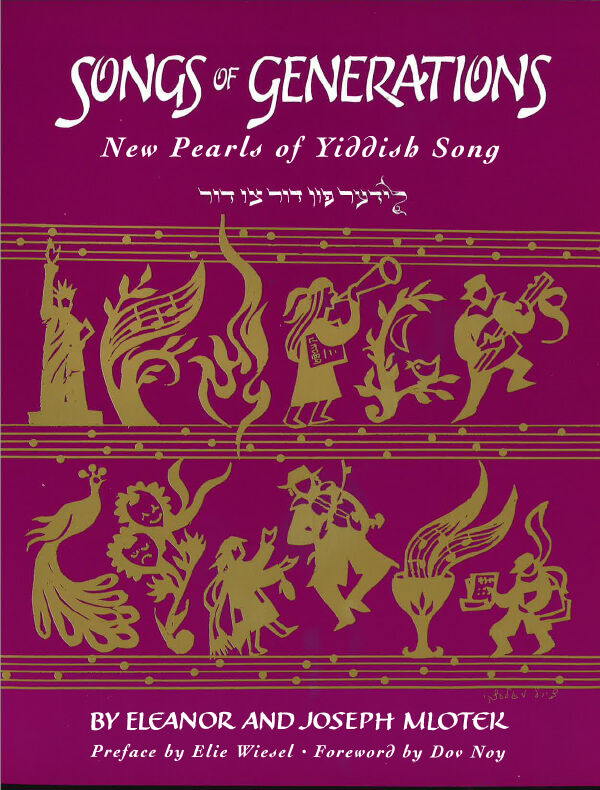Words by H. Leivick (1888-1962). The melody by L. Birnov, which was recorded by cantor Misha Alexandrovich, was transcribed by compilers. Another melody to the poem was written by American Yiddish composer Solomon Goluborn

Lay your head on my knees,
it’s good to lie like that;
Children fall asleep themselves,
grown-ups have to be rocked.
Children have little toys –
and play whenever they want;
Grown-ups play only by themselves,
and have to play forever.
Have no fear– I am here,
I will not reject you;
Youve cried enough today,
as befits a grown-up.
You’ve cried your eyes out–
now I will rock you to sleep;
Lay your head on my knees,
it’s good to lie like that.
Leyg dayn kop oyf mayne kni,
Gut azoy tsu lign;
Kinder shlofn ayn aleyn,
Groyse dart men vign.
Kinder hobn shpilekhlekh,
Shpiln ven zey viln;
Groyse shpilri nor mit zikh,
Muzn eybik shpiln.
Hob nit moyre — ikh bin do,
Kh’vel dir nit farshtoysn;
Host genug geveynt shoyn haynt,
Vi es past a groysn.
Ongeveynt un ongeklogt —
Kh’vel dir itst farvign;
Leyg dayn kop oyf mayne kni,
Gut azoy tsu lign.
לײג דײַן קאָפּ אױף מײַנע קני,
גוט אַזױ צו ליגן;
קינדער שלאָפֿן אײַן אַלײן,
גרױסע דאַרף מען װיגן.
קינדער האָבן שפּילעכלעך,
שפּילן װען זי װילן:
גרױסע שפּילן נאָר מיט זיך,
מוזן אײביק שפּילן.
האָב ניט מורא — איך בין דאָ
כ׳װעל דיר ניט פֿאַרשטױסן;
האָסט גענוג געװײנט שױן הײַנט,
װי עס פּאַסט אַ גרױסן.
אָנגעװײנט און אָנגעקלאָגט —
כ׳װעל דיר איצט פֿאַרװיגן;
לײג דײן קאָפּ אױף מײַנע קני,
גוט אַזױ צו ליגן.
Song Title: Leyg Dayn Kop

The Songs of Generations: New Pearls of Yiddish Song anthology comprises songs that were either never printed before or appeared in rare and inaccessible publications — sometimes in different versions and without proper sources. Most of the songs in this book were submitted by readers of Chana and Yosl’s column “Perl fun der yidisher poezye” (Pearls of Yiddish Poetry) in the Yiddish newspaper Der Forverts (The Forward), initiated in October, 1970. Over 25 years, thousands of songs were collected in correspondence and on cassettes from readers throughout the world, and they represent a veritable national Yiddish song archive. Chana Mlotek, in her introduction, writes, “In the course of years the inquiries, contributions and enthusiasm of these readers have kept our own interest unflagging and have reinforced our dedication to this effort. And in recent years our participants have also been augmented by new readers from the former Soviet Russia, who receive our newspaper there or from newly-arrived immigrants in this country and Israel.”